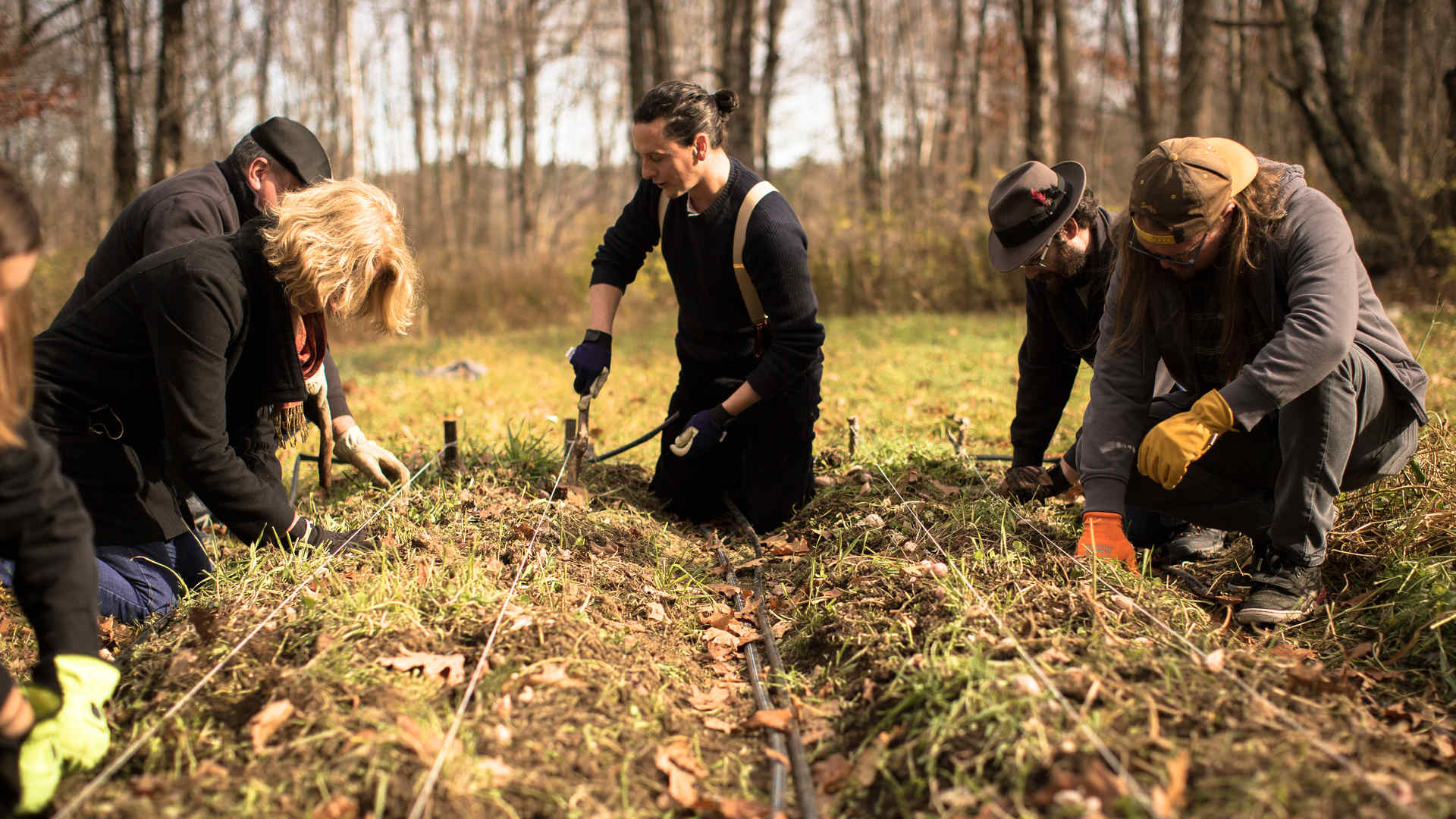
By Susan Jackson
Earlier this academic year, we were suddenly hearing about community members who were involved with farming in some way. We put out a call for more in the fall Journal and got some great responses!
One of the initial submissions was from Hannah Neeleman (BFA ’12, dance). After she graduated from Juilliard, she and her husband lived in Brazil for a while. Inspired by sustainable ranching practices they saw there, they moved to Utah and began Ballerina Farm. Using some of those sustainable practices, they raise Berkshire pigs and Angus cattle—along with their six kids. The goal is to stay connected to the variety of food we eat, produce less waste, and help the farming economy. ballerinafarm.org
Molly Yeh (BM ’11, percussion) turned her performance chops to unexpected ends when she ended up leaving her postgrad life in Brooklyn and flashy job as the editorial assistant at the Juilliard Journal to move with her now-husband Nick Hagen (BM ’09, trombone) to his family’s farm outside Grand Forks, North Dakota, on the Minnesota border. She’s since turned her loves of cooking and writing into several cookbooks and the Food Network show Girl Meets Farm, which is now in its ninth season.

“Being on the farm is just like being in one massive practice room. It’s quiet (except for chicken roosts), peaceful, and easy to focus on work. Spending my days creating food and TV gives me the same sort of creative fulfillment that I’d get after a great AXIOM concert,” Yeh says. “While the freelance music scene in Grand Forks isn’t as busy as New York’s (ha!), I’m still keeping up my chops by playing hand drums while singing ‘Baby Beluga’ with my two-year-old, Bernie.”
In 2020, Adam Weinert (BFA ’08, dance) and Brett Perry (BFA ’08) inaugurated Jacob’s Garden, a micro-farm and living archive on the campus of Jacob’s Pillow Dance Festival. Imagined as a place to nourish body and soul, the garden connects the dancers and audiences of Jacob’s Pillow to the multiple histories that exist on the land while pointing to a more sustainable future. Inspired by Weinert’s Bessie award-winning work reviving the works of Ted Shawn, the garden is part of Shawn’s legacy at Jacob’s Pillow and a sustainable food source for the community. This winter, Weinert is growing The Jacob’s Pillow Garden Community Cookbook to collect and share recipes, ideas, and wellness strategies. To join in or learn more, visit jacobsgarden.org.
Brian Flescher (BM ’09, percussion) lives in an intentional community called Ananda Farm on Camano Island, Washington, with 10 full-time people and 20 more friends who help out when needed. “We are a no-till farm, and do most things by hand,” Flescher says. “Our style of farming is called natural farming, and sometimes we refer to it as ‘garden farming.’ There are many different plants growing together in each row, usually with fruit/nut trees as well. Our longer-term vision is to create mostly food.”
Flescher’s group has a farm store, does markets during the growing season, and has farm suppers—with performances!—once a month. “This past year we had a great choir—it just so happened that we had three or four people for each voice range.” anandafarms.com
Adison Evans (BM ’12, jazz studies) was finalizing tour plans with her band when the pandemic hit. “With the desire to give back to my community and our planet, I returned to my rural New Jersey roots,” she writes. “With distribution shortages between local farmers (friends of my grandparents) and consumers and the amount of people experiencing food insecurity in my neighborhood in Hudson County, I decided to help transport fresh produce to the local community fridge on a regular basis.”
Seeing how much food goes to waste, she started Neighborhood Compost, an organics collection service that provides five gallon buckets to subscribers—there are now 150 of them. Neighborhood Compost picks up food scraps and organic waste—more than 80,000 pounds of waste so far—to divert them from the landfill. The Evans family farm then turns it into nutrient-dense compost. “When food scraps and organic material go to the landfill, they don’t break down; they emit harmful methane gases that directly contribute to global warming,” Evans says. “We treat organic material like the resource it is and provide the ideal environment to break down in our heated, aerated compost piles.”
The benefits of compost, Evans says, include growing healthier crops, reducing erosion, eliminating the need for chemical pesticides, and increasing soil retention: “My vision for Neighborhood Compost is to cultivate community through regenerative agricultural efforts, grow our food rescue program and education program and ultimately shift the planet toward a more equitable, sustainable, and loving place for our generation and many more to come.” neighborhoodcompost.org
Sam Budish (BM ’11, MM ’13, percussion) “first entered the world of plants during the summer of 2020 tending to my family’s vegetable garden in Stockbridge, Massachusetts. I was learning a lot and although it wasn’t much, growing some food for the family meals was extremely rewarding and enjoyable,” he writes. Wanting to learn more, he started volunteering at Helia Native Nursery, which focuses on growing native plants. “Having more hands on experience and guidance was really eye-opening, and I eventually landed a job at Windy Hill Farm as a member of the orchard crew, which involved picking apples and making cider.”
Budish and his partner subsequently relocated to Kingston, New York, where he ended up working at nearby Spruce Run and Stony Ridge Farm. “We are certified organic, growing vegetables, berries and flowers on less than an acre; it’s amazing what you can produce with just that amount of space,” he says. “We had a CSA of about 40 people and went to three farmers markets. The farm doesn’t operate during the winter, so now I can shift my focus back to music and the percussive arts, though I occasionally help out at Twin Brook Farm, which has a herd of 25 bison.”
Juilliard alums with farmer/foodie connections isn’t a new topic, of course. Just last year, we reported on David Keck (’06, voice), who, just before the pandemic began, sold his stake in a restaurant group he’d founded in Houston, moved back to his home state, Vermont, and is managing a vineyard and has developed a new wine portfolio, called Stella14.
And we know there are more of you out there! Tell us about your connection to the land at [email protected].